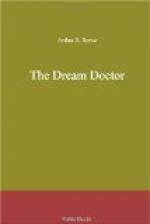As Kennedy examined it, he remarked, shaking his head in confirmation of his own opinion, “That must have been done by a Behr bulletless gun.”
“A bulletless gun?” I repeated.
“Yes, a sort of pistol with a spring-operated device that projects a sharp blade with great force. No bullet and no powder are used in it. But when it is placed directly over a vital point of the skull so that the aim is unerring, a trigger lets a long knife shoot out with tremendous force, and death is instantaneous.”
Near the door, leading to the courtyard that opened on the side street, were some spots of blood. They were so far from the place where the valet had discovered the body of the chef that there could be no doubt that they were blood from the murderer himself. Kennedy’s reasoning in the matter seemed irresistible.
He looked under the table near the door, covered with a large light cloth. Beneath the table and behind the cloth he found another blood spot.
“How did that land there?” he mused aloud. “The table-cloth is bloodless.”
Craig appeared to think a moment. Then he unlocked and opened the door. A current of air was created and blew the cloth aside.
“Clearly,” he exclaimed, “that drop of blood was wafted under the table as the door was opened. The chances are all that it came from a cut on perhaps the hand or face of the murderer himself.”
It seemed to be entirely reasonable, for the bloodstains about the room were such as to indicate that he had been badly cut by the carving-knife.
“Whoever attacked the chef must have been deeply wounded,” I remarked, picking up the bloody knife and looking about at the stains, comparatively few of which could have come from the one deep fatal wound in the head of the victim.
Kennedy was still engrossed in a study of the stains, evidently considering that their size, shape, and location might throw some light on what had occurred. “Walter,” he said finally, “while I’m busy here, I wish you would find that valet, Edward. I want to talk to him.”
I found him at last, a clean-cut young fellow of much above average intelligence.
“There are some things I have not yet got clearly, Edward,” began Kennedy. “Now where was the body, exactly, when you opened the door?”
Edward pointed out the exact spot, near the side of the kitchen toward the door leading out to the breakfast room and opposite the ice-box.
“And the door to the side street?” asked Kennedy, to all appearances very favorably impressed by the young man.
“It was locked, sir,” he answered positively.
Kennedy was quite apparently considering the honesty and faithfulness of the servant. At last he leaned over and asked quickly, “Can I trust you?”
The frank, “Yes,” of the young fellow was convincing enough.
“What I want,” pursued Kennedy, “is to have some one inside this house who can tell me as much as he can see of the visitors, the messengers that come here this morning. It will be an act of loyalty to your employer, so that you need have no fear about that.”




